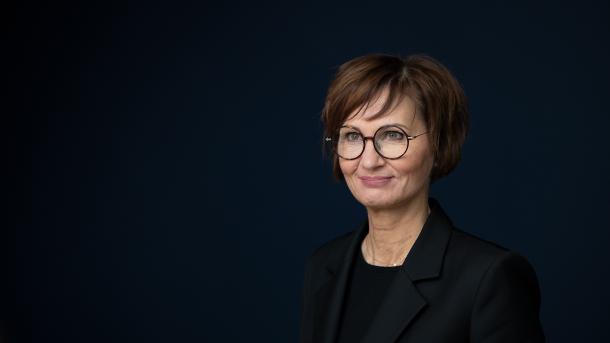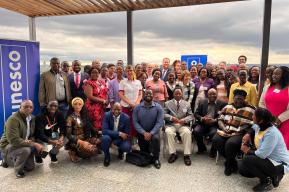News
‘There is still no unifying idea for adult education in the digital age.’

Five months into her role as Germany’s Federal Minister of Education and Research, Bettina Stark-Watzinger talked to the German Institute for Adult Education Leibnitz Centre for Lifelong Learning’s Scientific Director, Prof. Dr Josef Schrader, and Head of the Knowledge Transfer unit, Dr Peter Brandt, about her plans for the ministry – which she likes to call the ‘ministry of opportunities’ – and what they mean for adult and continuing education in the country. Ahead of the Seventh International Conference on Adult Education (CONFINTEA VII), the UNESCO Institute for Lifelong Learning translated the interview into English.
Dear Minister, the German Government has committed itself to ambitious reforms, particularly in the field of education. You yourself have announced a ‘decade of innovation’. The adult learning and education (ALE) community is looking to your ministry with high expectations. What are your own plans? What will you start with?
We have set ourselves a lot of goals for this legislative period in the field of education. Our aim is to offer people the best educational opportunities, regardless of their background. We want to enable participation and advancement – that is why I call Germany’s Ministry of Education and Research the ‘ministry of opportunities’.
One of our first projects is a reform of the student loan system because it no longer reflects reality – that is the main message I take away from my many conversations with young people. The eligibility criteria are designed in such a way that many are excluded from the very beginning; the age limits no longer fit, nor do the restrictions on changing subjects; and then the whole application procedure is too bureaucratic. We want the student loan system to provide the flexibility that enables more young people to access education and training. I hope that these reforms will be implemented by the beginning of the coming winter semester.
We plan to significantly increase the tax-free allowance and the housing cost allowance and raise the age limit for subsidies to 45 years. We are also implementing an emergency aid mechanism independent of student loans that will provide students with financial support in crisis situations such as COVID-19. And, finally, we want to introduce a support component that addresses the financial needs of learners independent from their socio-economic background via the basic child insurance, which the coalition agreement provides for.
Germany’s National Continuing Education Strategy is to continue with a new focus on ALE. How will this be promoted? What are the thematic focuses? Will you work with partners to implement the strategy?
In the last legislative period, the focus was on continuing vocational education and training; now, we also want to focus more on general continuing education. Being able to read, write and calculate; digital skills; a good knowledge of German – these are key skills that may not always be directly related to a specific profession but are generally prerequisites for professional advancement and promotion in Germany.
We want to place more emphasis on general continuing education in the implementation of the continuing education strategy and also want to involve new actors in some areas. For example, we are considering an open dialogue process with citizens and continuing education providers, such as adult education centres. We will first collect ideas together with as many stakeholders as possible and then set out on the path towards a new national culture of continuing education.
The German Government has also announced in the coalition agreement that it will work to ensure that tax exemptions for educational services be maintained. Can you already report on concrete steps here?
The Ministry of Education has a great interest in ensuring that as many people as possible make use of educational services. Of course, this is dependent on the price of such services. That is why we want to maintain the tax exemption for public education services and avoid an increase in the price of public education services at all costs.
You continue to pursue the goal of simplifying and accelerating the recognition of competences acquired informally, non-formally or abroad. Will there be an expansion of the ValiKom initiative?1
The recognition, validation and accreditation (RVA) of non-formal and informal competences is an important concern for me. RVA helps people without formal qualifications to integrate into the education and employment system.
Through the ValiKom initiative, we offer training for over 30 professions in 32 locations across Germany. We currently offer a standardized procedure for recording and certifying vocational competences that people have acquired on the job over the course of their lives. We will continue ValiKom until October 2024.
In parallel, we are examining the options for a validation law to follow on from ValiKom; such a law could regulate the validation procedure, i.e. the conditions for accreditation and the procedure itself.
The next step is to use ValiKom for the recognition of professional qualifications acquired abroad. Here, we want to introduce digital application procedures and thus simplify recognition. Support for procedural costs should also be possible so that more people can apply for recognition of their qualifications from abroad. For this, we need the support of the individual German states, because that is where recognition is carried out.
How do you plan to continue with the GRETA project, which develops and pilots products and processes for the recognition and validation of ALE teacher competences?
As a result of GRETA, there are tried and tested instruments that can be used directly in practice for the recognition of the professional competences of ALE teaching staff. The basis for this is a competence model that describes what a teacher in continuing education should be able to do in order to do a good job. A number of continuing education and training (CET) providers successfully use these instruments in staff development. This is a good example of the transfer of research results into practice.
How will you accomplish the integration of the various platform initiatives currently underway (e.g. the German Federal Ministry of Labour and Social Affairs’ national online further training [NOW] programme and the Federal Ministry of Education and Research’s Digital Platform for Vocational Training [INVITE]? Will there be a national education platform that integrates the above-mentioned initiatives?
We have been observing a dynamic development of education-related platforms for years; now it is time to turn these many individual offers into a coherent whole. For this purpose, we are creating a national education platform to act as an ecosystem that functions on the basis of fundamental standards and transparent governance. The goal is to provide a continuous ‘learning path’ that learners can travel using self-managed educational data. This promotes access to and participation in educational processes. It also makes it possible to change roles in the course of life: sometimes as a learner, sometimes as a teacher.
For now, however, the focus is on technical development: four prototypes have emerged from a funding competition. Based on these, we are now putting out tenders for the first parts of the future national education platform. In order for the platform to be filled with life, initiatives such as the INVITE competition – which recognizes innovations in digital continuing education – are key. Of course, we are also in close exchange with the current national continuing education platform, NOW. We want to develop the new national education platform in such a way that it is compatible with NOW from the outset.
The adult education sector has reacted favourably to the announcement that you are planning to introduce a funding programme for adult education centres and other non-profit educational institutions in order to improve digital infrastructures. What will this infrastructure look like, who will it benefit, and will the funding be temporary or permanent?
The 16 federal states of Germany, who are directly responsible for adult education at the local level, have been promoting digitalization for several years; this includes innovative learning opportunities as well as better equipping further education institutions with digital infrastructure. We are flanking this with large, structurally effective projects that no state could undertake on its own.
One example is the VHS Learning Portal, which is the country’s central digital learning platform for basic education and German as a second language, with around 950,000 learners. A new learning area, digital basic education, is currently being developed. With this, we are creating a new learning offer for people with low levels of literacy who can use digital devices, but who, for example, find it difficult to classify and evaluate information from the internet. We want to continue along this path together with the German states. It is important to join forces and focus our measures on the common goal of advancing digitalization in continuing education.
How do you want to tackle this?
From my point of view, there are still too many isolated solutions and no unifying idea of how ALE should be designed in our digital age. How can people acquire necessary digital skills? How and in which settings do adults want to learn? How should further education institutions position themselves today so they will still be up-to-date tomorrow? I would like to discuss these questions with federal states of Germany.
Together with the federal states you also want to promote the establishment, operation and networking of centres of excellence for digital and digitally supported teaching in schools and further education institutions and create a central point of contact for learning and teaching in the digital world. This is very important. After all, it is not enough to make digital offerings centrally and digitally accessible – they must also be checked for quality and further developed and evaluated. How can this be achieved?
We have also set our sights high in the area of digitalization in education. My ambition is to accelerate and de-bureaucratize the Digital Pact for Schools, the 2016 programme that aimed to provide formal and vocational schools with digital equipment and broadband. Together with the federal states, I want to remove obstacles.
Teacher training is also central for us. That is why we want to step up our efforts in this area. This includes the competence centres for digital and digital-supported teaching in schools and further education, the establishment of a nationwide coordination office, and the further development of the quality initiative for teacher training with a focus on digital education. Here, again, we want to work together with the federal states and with stakeholders. This is the only way we can develop and provide high-quality offers for our teachers and school administrators.
You also wish to ensure equality in education throughout Germany? From the Atlas on German Continuing Education,2 we know that there are major regional differences in offers of and participation in continuing education. What can the government do to address this and what do you expect from the states and municipalities?
Overall, we have a broad range of continuing education opportunities throughout Germany and participation is developing positively. This was also evident in the last Adult Education Survey (AES), wherein 60 per cent of those surveyed participated in at least one continuing education measure in 2020. That is six percentage points more than in 2018, and the rates in western and eastern Germany are at a comparable level.
In order to improve access to continuing education where people live, work and learn, and to create additional educational opportunities, my ministry is once again stepping up its support for municipal education management with the new ‘Education Municipalities’ programme. On the basis of reliable data, municipalities can optimally adapt their educational offers to local needs. By networking analogue and digital offers, the education landscapes are modernized, and the municipalities can set thematic priorities – for example, when it comes to securing skilled workers and structural change. At the local level, of course, stakeholders are still called upon to design opportunities that can be easily accessed by the target groups. The goal must be to offer something to all citizens, digitally and locally.
Cooperation, in particular between universities of applied sciences, small- and medium-sized enterprises and social and public organizations, is to be promoted through a German Agency for Transfer and Innovation (DATI), but what can be done to close the gap between education policy and practice, which remains large despite the considerable funding that empirical education research has received in recent years, not least through your ministry? In your view, what should be done to narrow this gap?
Through our funding, we have succeeded in developing a broad scientific basis to inform evidence-based education policy. For example, research on reducing barriers to education reveal the concrete measures we can take to improve the opportunities of socially disadvantaged children and young people, and research projects on digitalization in education provide us with insights into how the teaching and learning of such skills can be improved in schools.
However, once the Federal Ministry of Education provides the findings, it is up to the states to implement the changes. It is up to the ministries of education, science and cultural affairs to take the findings from empirical education research into account in their political actions.
What do you expect from universities and from non-university institutions? How do you envisage cooperation? What priorities do you want to set in the promotion of educational research, also with regard to ALE?
Germany has a strong and diverse science system. Outstanding research and teaching takes place at many locations and in various institutions across Germany. With the coalition agreement, we clearly advocate for a strong science and research system with with universities at the centre. We are committed to a wide variety of forms of cooperation with different partners: on the one hand, we promote new forms of cooperation that use and support existing synergies; on the other hand, cooperation between universities and non-university research institutions are a central goal.
There is already much less work in silos than 10 years ago. In order to improve this situation even more, we want to establish a joint strategy wherein major science organizations – e.g. the Max-Planck-Gesellschaft, the Helmholtz Association, the Fraunhofer Association and the Leibniz Association – work together more closely across institutions and in cooperation with universities. What is often overlooked is that there is strong and internationally recognized educational research, not only in universities but also in these scientific organizations. I hope that these institutes will continue to act self-confidently and strategically in the science system.
In the area of continuing vocational education and training (CVET), the Federal Ministry of Labour and Social Affairs (BMAS) has launched many initiatives in recent years. These include, for example, the planned establishment of further-training agencies, the qualification allowance, the revised role of the Federal Employment Agency as an advisory body, etc. How will you shape the cooperation between the Federal Ministry of Education and Research and the BMAS? What role do you see for your ministry with regard to continuing education?
In the National Continuing Education and Skills Strategy, BMAS and the Federal Ministry of Education and Research are working together with many partners to promote continuing education and training for employees and in companies. This includes the measures you mentioned. Important topics for us here are, for example, the expansion of higher vocational qualifications via the ‘advanced student loan’ initiative, the digitalization initiative INVITE, as well as the initiative that sponsors ‘training mentors’, who work with learners directly and motivate them to continue their education.
It is important to make the opportunities for further education better known so that even more people participate. I am planning an ‘excellence initiative for vocational education and training’, which is intended to give a new impetus to CET. In this way, we will be well-equipped to meet the increasing demand for skilled workers in the future and to provide educational opportunities to all people.
1 Germany’s ValiKom initiative was developed to assess and certify vocational skills acquired outside the formal education system.
2 The Deutsche Weiterbildungsatlas (Atlas on German Continuing education) is a research project that analyses regional and municipal differences in continuing education programmes and participation.
This interview was originally published in German by the German Institute for Adult Education (DIE). It was translated into English by the UNESCO Institute for Lifelong Learning. CC-Lizenz BY-SA 3.0/4.0 deutsch








